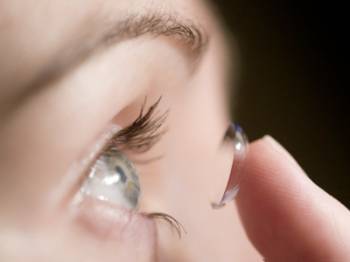Contact Lenses
 Contact lenses are used very commonly today as an alternative to wearing glasses. Contact lenses are thin discs, made of plastic, placed on the cornea of the eye. Unlike before, there are many different types of lenses available today, from soft contact lenses, soft disposable lenses, rigid gas permeable (RGP) lenses, as well as cosmetic lenses.
Contact lenses are used very commonly today as an alternative to wearing glasses. Contact lenses are thin discs, made of plastic, placed on the cornea of the eye. Unlike before, there are many different types of lenses available today, from soft contact lenses, soft disposable lenses, rigid gas permeable (RGP) lenses, as well as cosmetic lenses.
Contact lens prescriptions are not the same as prescriptions for glasses, as other than specifications for vision correction, there is also a need for specific curvatures and diameters to be measured for contact lenses. Hence, having contact lenses fitted by a qualified optometrist is essential.
If you are prone to frequent eye infections or have sensitive eyes (allergic conjunctivitis), wearing contact lenses may not be for you. Contact lenses are also fairly small, and require some dexterity to handle them. If you think you may have difficulty handling them, contact lenses may not be a suitable option.
Risks and Side Effects of Wearing Contact Lenses
Wearing contact lenses are not without its risks. Doctors have, in recent years, seen a significant increase in the number of complications arising from the use of contact lenses especially in patients who do not take proper precautions.
Some of the common problems associated with contact lens wear include:
1. Hypoxia
Hypoxia is the insufficient oxygen supply, in this case, to the cornea. When a contact lens is placed over the cornea, it limits the amount of oxygen that can reach the eye. Hypoxia to the eye can lead to tired eyes, discomfort, grittiness or even blurred vision, especially towards the end of the wearing period. This is sometimes known as "corneal exhaustion syndrome".
To reduce the chance of hypoxia, you may do the following:
• do not sleep with your contact lenses on
• reduce the number of hours per day you wear your contact lenses
• change to extended wear lenses
2. Infections:
Wearing contact lenses, especially without proper lens care, can lead to infections in the eye. The most dreaded complication of contact lens wear, which can potentially lead to blindness, is corneal ulceration, or infection. Corneal ulcerations occur more frequently among those who use soft lenses, simply because soft lenses feel more comfortable, and many use them for extended periods of time. Other factors which contribute to infections include:
• Sleeping with contact lenses on
• Poor sanitation and cleaning habits (some have been known to lubricate their contact lenses with their own saliva if cleaning supplies are not available. This is definitely not recommended!)
With rigid lenses, there is an increased risk for abrasions to the cornea. Eye pain and tearing are common symptoms of corneal abrasions. If not managed properly, infections to the cornea can set in.
3. Dry Eyes:
A very common complaint by contact lens wearers is that their eyes feel very dry. A layer of tears is important for good vision and eye comfort, hence dry eyes commonly feel irritated, and vision may also be blurred. The best way to cope with this problem is to reduce the number of hours of contact lens use per day, and to use lubricant eye drops, as prescribed by your eye care specialist.
Tips For Successful Use Of Contact Lenses
Knowing how to care for your lenses and using them correctly can mean comfortable, problem-free contact lens use.
• Only use commercial cleaning solutions for your contact lenses.
• Do not mix different brands of solutions.
• Do not share your contact lenses.
• Always wash your hands with soap and water prior to handling your contact lenses, not just when putting on your lenses, but also before removal.
• Rinse your contact lens case with water and air dry. Contact lens cases should be cleaned and replaced regularly.
• Do not use water to clean your lenses.
• Never wear your lenses when swimming, even when using goggles.
• Do not sleep with your lenses on. Even naps can potentially cause problems, as during sleep, it is more difficult to get oxygen to your eyes.
• As tempting as it may be, never wear your lenses beyond their expiry date. Daily lenses are to be changed daily, weekly lenses to be changed weekly and so on.
• Follow a wearing schedule. Different lenses are made for different wearing schedules.
• Keep your eyes well lubricated by using lubricating solutions recommended by your eye care professional.
• Wear your contact lenses before applying makeup, and remove your lenses before removing makeup. This will help reduce the chance of contamination.
• See your doctor or ophthalmologist immediately if you notice symptoms such as eye redness, itching, blurred vision or discharge. Do not wear your contact lenses until your eyes have been thoroughly checked.
The article above is meant to provide general information and does not replace a doctor's consultation.
Please see your doctor for professional advice.
